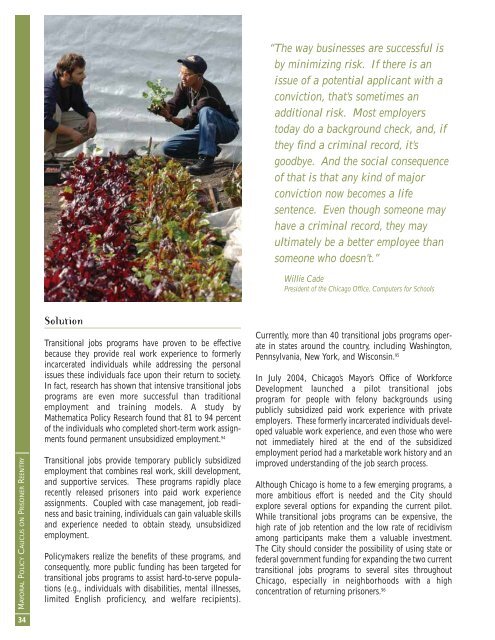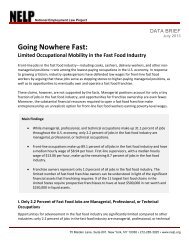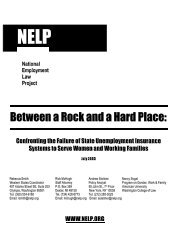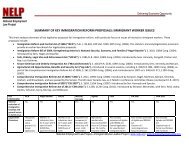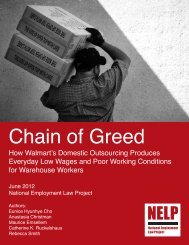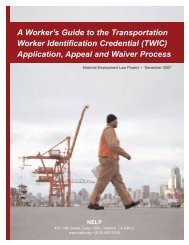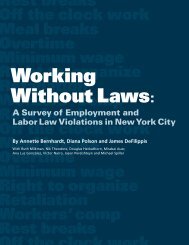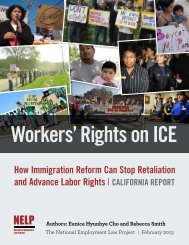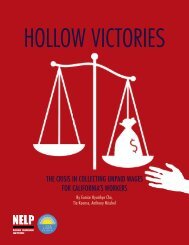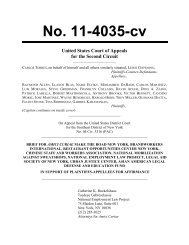Rebuilding Lives. Strengthening Communities.
Rebuilding Lives. Strengthening Communities.
Rebuilding Lives. Strengthening Communities.
You also want an ePaper? Increase the reach of your titles
YUMPU automatically turns print PDFs into web optimized ePapers that Google loves.
“The way businesses are successful is<br />
by minimizing risk. If there is an<br />
issue of a potential applicant with a<br />
conviction, that’s sometimes an<br />
additional risk. Most employers<br />
today do a background check, and, if<br />
they find a criminal record, it’s<br />
goodbye. And the social consequence<br />
of that is that any kind of major<br />
conviction now becomes a life<br />
sentence. Even though someone may<br />
have a criminal record, they may<br />
ultimately be a better employee than<br />
someone who doesn’t.”<br />
Willie Cade<br />
President of the Chicago Office, Computers for Schools<br />
MAYORAL POLICY CAUCUS ON PRISONER REENTRY<br />
Solution<br />
Transitional jobs programs have proven to be effective<br />
because they provide real work experience to formerly<br />
incarcerated individuals while addressing the personal<br />
issues these individuals face upon their return to society.<br />
In fact, research has shown that intensive transitional jobs<br />
programs are even more successful than traditional<br />
employment and training models. A study by<br />
Mathematica Policy Research found that 81 to 94 percent<br />
of the individuals who completed short-term work assignments<br />
found permanent unsubsidized employment. 94<br />
Transitional jobs provide temporary publicly subsidized<br />
employment that combines real work, skill development,<br />
and supportive services. These programs rapidly place<br />
recently released prisoners into paid work experience<br />
assignments. Coupled with case management, job readiness<br />
and basic training, individuals can gain valuable skills<br />
and experience needed to obtain steady, unsubsidized<br />
employment.<br />
Policymakers realize the benefits of these programs, and<br />
consequently, more public funding has been targeted for<br />
transitional jobs programs to assist hard-to-serve populations<br />
(e.g., individuals with disabilities, mental illnesses,<br />
limited English proficiency, and welfare recipients).<br />
Currently, more than 40 transitional jobs programs operate<br />
in states around the country, including Washington,<br />
Pennsylvania, New York, and Wisconsin. 95<br />
In July 2004, Chicago’s Mayor’s Office of Workforce<br />
Development launched a pilot transitional jobs<br />
program for people with felony backgrounds using<br />
publicly subsidized paid work experience with private<br />
employers. These formerly incarcerated individuals developed<br />
valuable work experience, and even those who were<br />
not immediately hired at the end of the subsidized<br />
employment period had a marketable work history and an<br />
improved understanding of the job search process.<br />
Although Chicago is home to a few emerging programs, a<br />
more ambitious effort is needed and the City should<br />
explore several options for expanding the current pilot.<br />
While transitional jobs programs can be expensive, the<br />
high rate of job retention and the low rate of recidivism<br />
among participants make them a valuable investment.<br />
The City should consider the possibility of using state or<br />
federal government funding for expanding the two current<br />
transitional jobs programs to several sites throughout<br />
Chicago, especially in neighborhoods with a high<br />
concentration of returning prisoners. 96<br />
34


